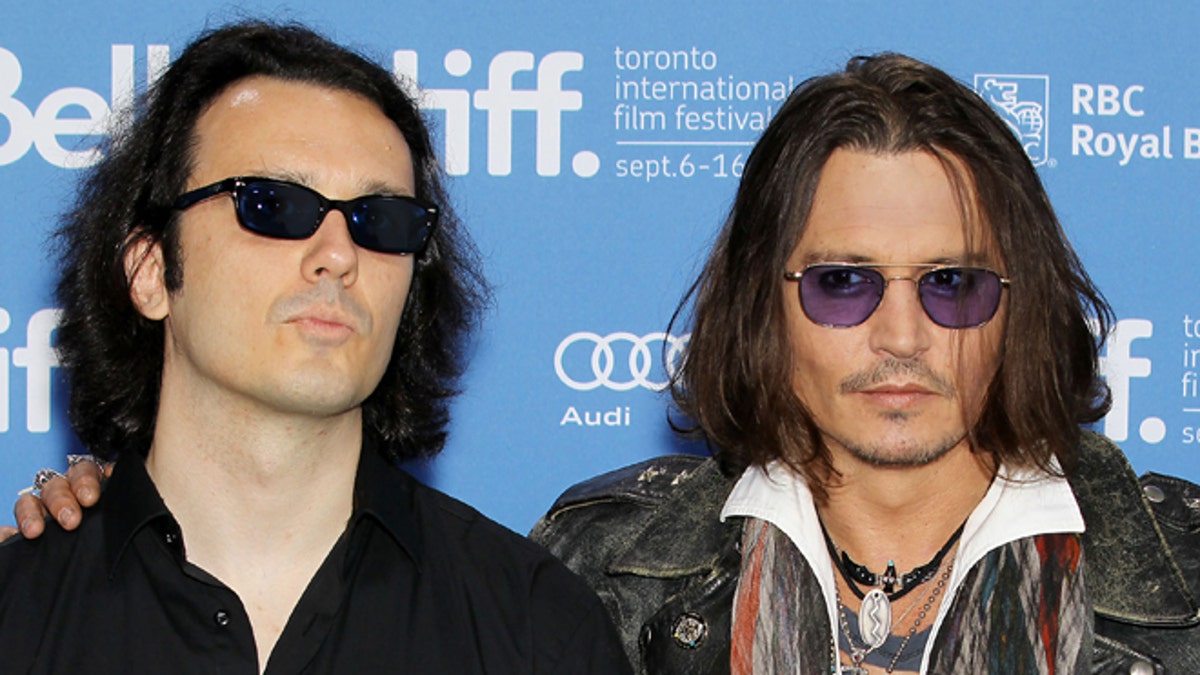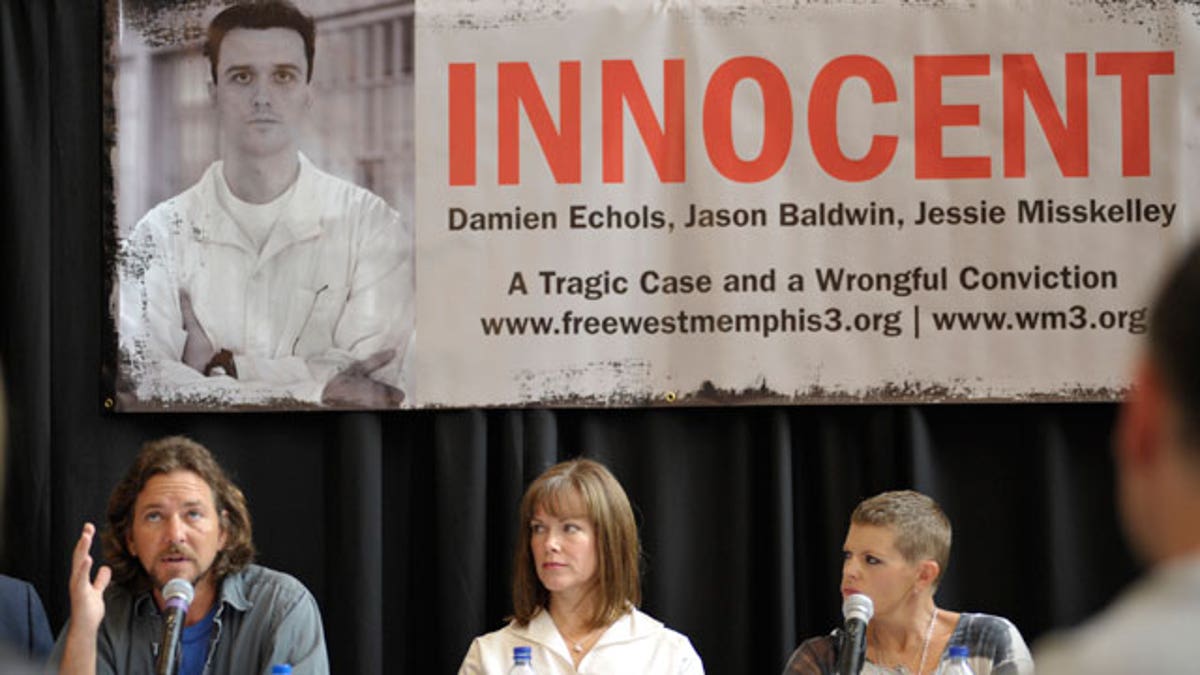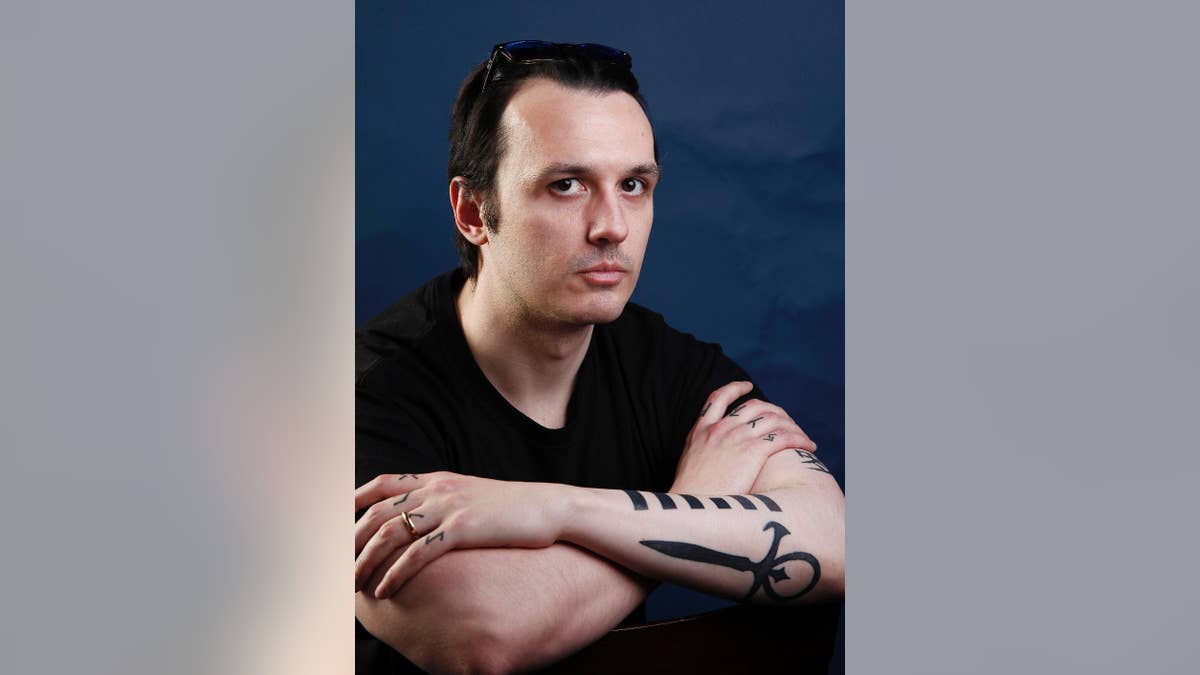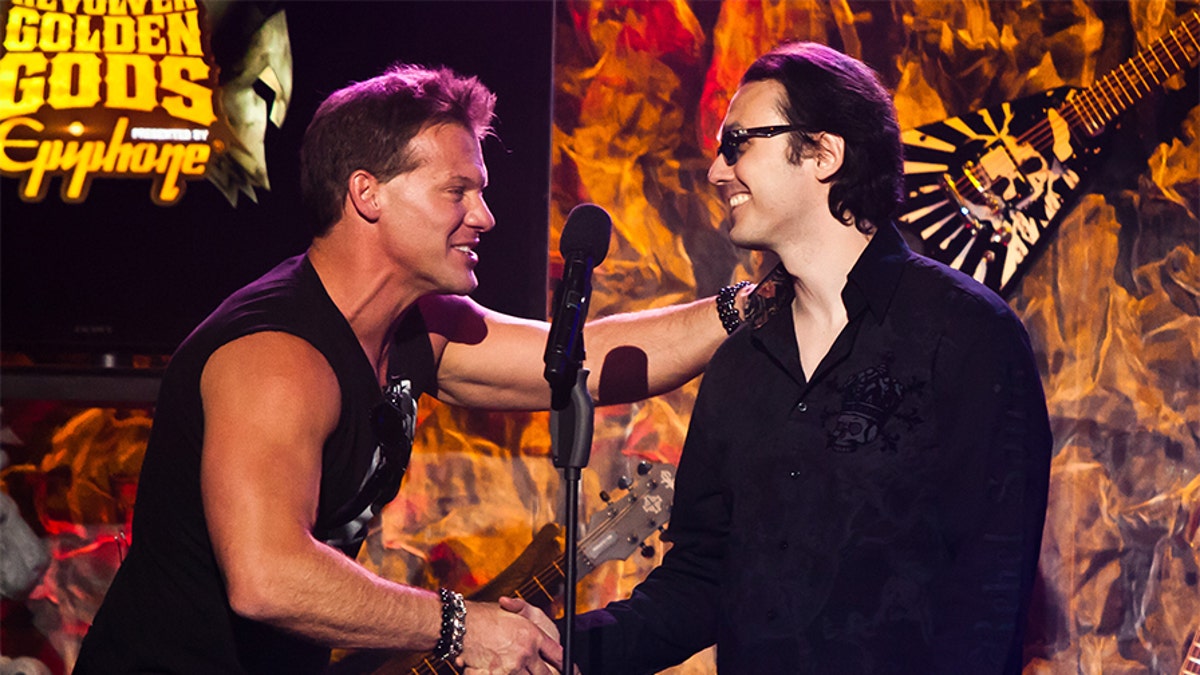
Damien Echols, one of the West Memphis Three, and actor Johnny Depp at a press conference for the film "West of Memphis" at the 2012 Toronto International Film Festival in Toronto. (AP/StarPix)
Damien Echols, who awaited execution on death row for 18 years before being released in 2011, won’t be tuning in to any true crime documentaries captivating audiences across America anytime soon.
While he has been the subject of several films and books, he’s not keen on catching up on television.
“Honestly, I pay very little attention to it,” the now-44-year-old told Fox News about the true crime phenomenon impacting pop culture. "It’s not something I have paid very much attention at all. I was in prison for almost 20 years, so now I’m trying to make up for lost time."
The Arkansas native, along with Jessie Misskelley Jr. and Jason Baldwin, spent nearly two decades behind bars for the 1993 murders of three 8-year-old boys – Steve Branch, Michael Moore and Christopher Byers – in West Memphis. The children were found in a ditch hogtied with shoelaces.
FORMER WEST MEMPHIS THREE DETAILS 'LIFE AFTER DEATH'
Echols, Misskelley and Baldwin, all teenagers at the time of the grisly killings, were convicted of the murders despite lack of concrete evidence that linked them to the slayings. Echols' interest in the occult, heavy metal and black clothing, in particular, prompted many in the Bible Belt state to label him the ringleader of a Satanic cult.

Singer Eddie Vedder, left, Lori Davis, center, wife of Damien Echols, and singer Natalie Maines, right, participate in a news conference Saturday, Aug. 28, 2010, before the "Voices for Justice" concert in Little Rock, Ark. Supporters of the "West Memphis Three" argue there were two sets of victims from the May 5, 1993 crime: the three murdered 8-year-olds and Damien Echols, Jason Baldwin and Jessie Misskelley, the then-teenagers who defenders claim were wrongly convicted in the deaths. (AP)
Baldwin and Misskelley, the alleged accomplices, were sentenced to life in prison. Echols was sentenced to death.
The trio, famously known as the “West Memphis Three,” were the subjects of the “Paradise Lost” documentaries, which captivated many supporters, including several celebrities. Johnny Depp, along with Pearl Jam’s Eddie Vedder, Natalie Maines of the Dixie Chicks, Henry Rollins and filmmaker Peter Jackson helped pay the legal fees to free the three men.
FORMER NATION OF YAHWEH MEMBER TELLS ALL
The men were offered the Alford plea deal in 2011 after new DNA evidence supported their innocence, The New York Times previously reported. The terms of the deal meant they were allowed to maintain their innocence while pleading guilty. The trio was released from prison that year.
Echols is very candid about what he describes as one of the most horrific moments of his life. He has written several books about his experience, including his 2012 memoir “Life After Death,” along with 2014’s “Yours for Eternity” about the intimate letters he shared with his now wife Lorri Davis while in prison, as well as 2018’s “High Magick” about his spiritual practices.
He is also participating in two events at the true crime festival Death Becomes Us in New York City, including a lecture with actor/comedian Dave Hill, as well as a discussion on being wrongfully accused alongside Amanda Knox and author John Douglas, with filmmaker Joe Berlinger moderating.
“Dave Hill is always light-hearted,” explained Echols. “… When you’re talking about being innocent on death row, it can easily turn into a heavy conversation. But he keeps it really light so it’s not depressing. It feels good talking to him. … Amanda Knox, I’ve met a few times. … I thought it would be a fun time despite the subject matter.”
Echols revealed one of the things he wanted to share with audiences is the trauma he endured not just from being locked up, but from the moment he was free.

In this Jan. 22, 2012, file photo, documentary subject Damien Echols, from the film "West of Memphis," poses for a portrait in Park City, Utah. Echols spent nearly 18 years on Arkansas' death row before he and two others were freed in 2011 as part of a plea deal. (AP Photo/Carlo Allegri, File) (The Associated Press)
“Keep in mind, I walked out of prison in 2011,” said Echols. “When I did, I had not seen a computer since 1986. Back then, they were nothing like they are now. There were no cell phones. I had never used an ATM machine. You’re walking into a whole new world… And when I walked out, I did not have a single penny to my name. Did not even had clothes to change into. I would have been homeless if not for people coming together to help me, to give me support."
“But even then, it was incredibly hard,” he continued. “Not only was I in prison for over 10 years, but I was also in solitary confinement for almost the last half of that. So I wasn’t even used to a great deal of human interaction anymore…. It’s almost like being dropped off on a completely different world and expected to find your way and know how to exist. It can be emotionally and psychologically devastating.”
SECRET TED BUNDY TAPES REVEALED
Still, Echols said he is grateful for his freedom after he believed death was certain if he remained in prison. He described losing all hope and relying on close friends to send him books to read and visit him to discuss literature. He said it gave him a sense of purpose, despite waiting for a lethal injection.

Lori Davis and husband author Damien Echols of the West Memphis Three visit "The Opie & Anthony Show" at SiriusXM Studio on Sept. 19, 2012 in New York City. ((Photo by Taylor Hill/Getty Images)
“It gave me something to focus on other than the hell that I found myself in,” he reflected. “When you first arrive in prison, you keep thinking every second of every day, surely somebody’s going to stop this any minute. Surely, someone is going to realize something is wrong here and fix the situation. You think about that constantly. But if you keep doing that over an extended period of time, you’re probably going to go insane... If you’re going to survive in there, you have to focus on something besides the misery of the situation.”
Echols said that if it weren’t for cameras being inside the courtroom during the trial, his case probably wouldn’t have gotten the attention of the press or the stars that rallied behind him.
“We were all extremely poor,” said Echols. “Just poor white trash of the South. You have no real means of mounting any sort of defense to clear your name. You can’t afford DNA testing. You can’t afford expert witnesses. You can’t afford any of the things the state has. You’re lucky if you’re able to scrape enough money to hire a private investigator to look into things. … You’re really outmatched, outgunned in every single way. It was these high profile supporters who were helping us raise awareness about the case, helping to pay for legal fees… They really gave us a fighting chance.”
COCAINE GODMOTHER'S SON TELLS ALL

Chris Jericho (L) and Damien Echols (R) attend the 4th annual Revolver Golden Gods awards at Club Nokia on April 11, 2012 in Los Angeles, Calif.. (Photo by Chelsea Lauren/WireImage)
Forensic experts said DNA evidence tied Terry Hobbs, Branch’s stepfather, to the crime scene, WREG-TV reported in 2013. A neighbor also allegedly saw him with the boys that night. However, Hobbs maintains his innocence, insisting it was Hollywood hype that set the real killers free. The murders remain unsolved.
Echols said reliving his past to the many who were curious about the case was initially emotionally draining. However, things have changed for him over the years.
“When I got out of prison… I was talking about what had happened to me almost constantly,” Echols recalled. “It kind of forces you to relive it over and over again to the point where you can almost feel like you’re not even out of prison. You may be physically out, but you’re still having to relieve it mentally and emotionally.
"I think for a while, it became really detrimental to my attempt to have a life again, to move into normal life and be a regular part of society. So I had to take time off from it after that. Just because it really did start to affect me. But I’ve been out long enough now…. I’ve had more time to heal and distance myself from it. So it doesn’t bother me nearly as much as it did in the beginning.”
Today, Echols is rarely seen without sunglasses, a product of not seeing much daylight after spending so many years in a prison cell. Still, life he says, is pretty good. However, he’s aware that there are others out there, wrongfully convicted, who aren’t as lucky.
CLICK HERE TO GET THE FOX NEWS APP
“One of the main things that I always keep in mind is that every single person who hears my story is a potential jury member on another case somewhere in this country and sometime in the future,” said Echols. “Every single person who hears what happened to me could potentially make certain that it doesn’t happen to someone else. So that’s the number one thing that I hope comes out of this — that my story in some way helps prevent the same thing from happening to someone else.”
"Death Becomes Us" festival runs from March 20-24. The Associated Press contributed to this report.





















